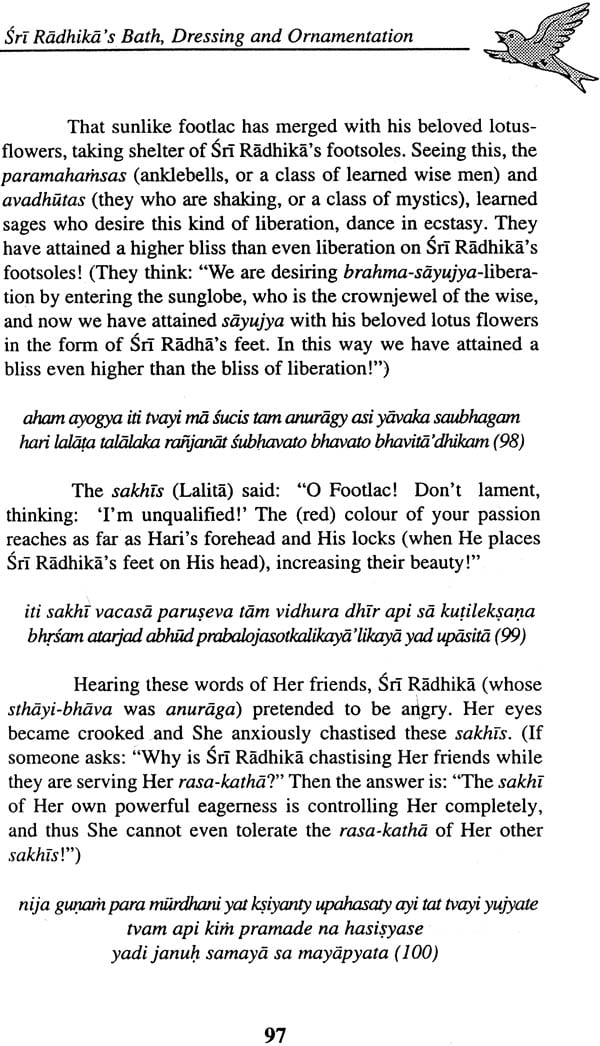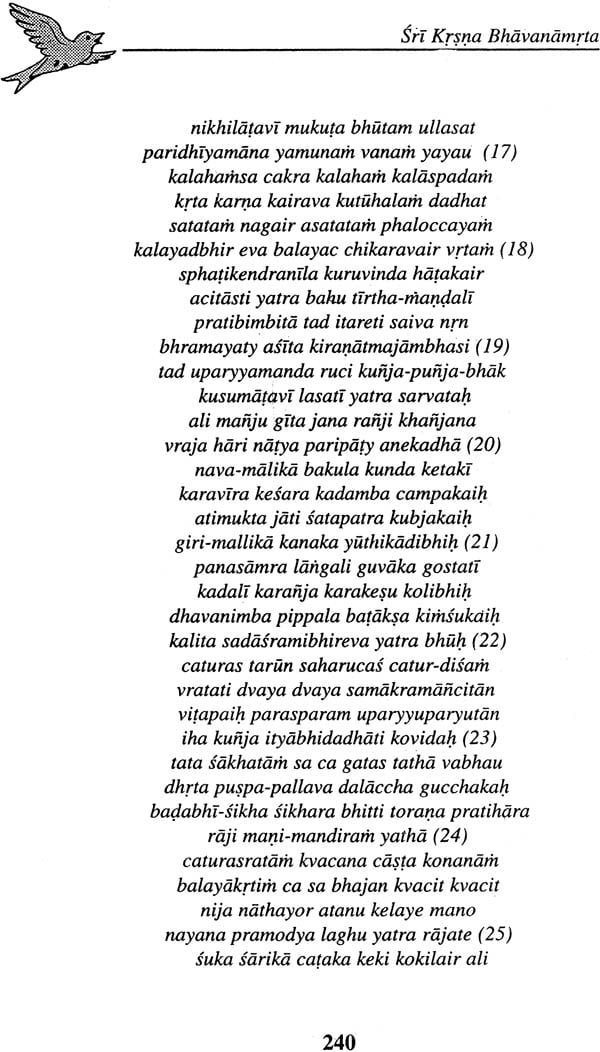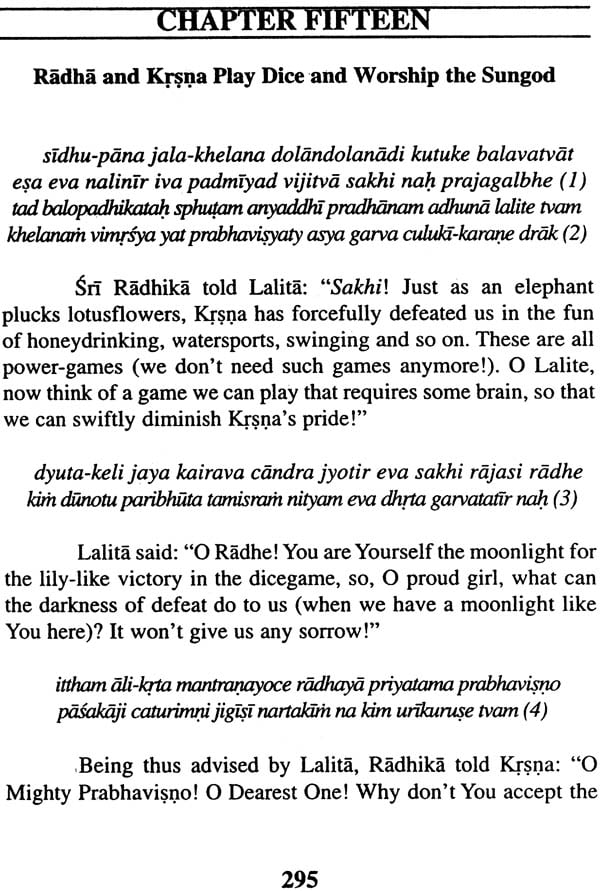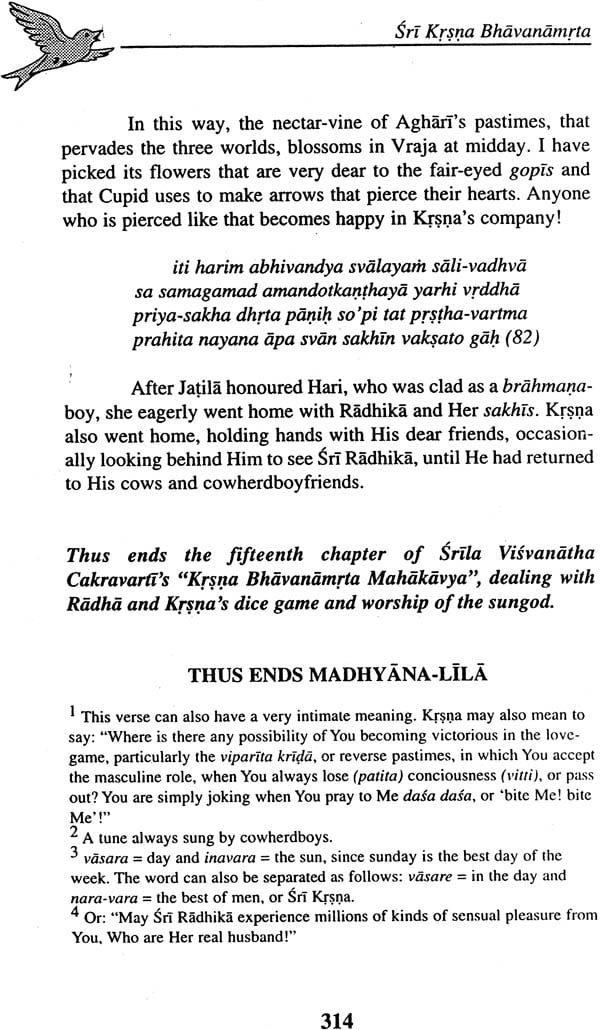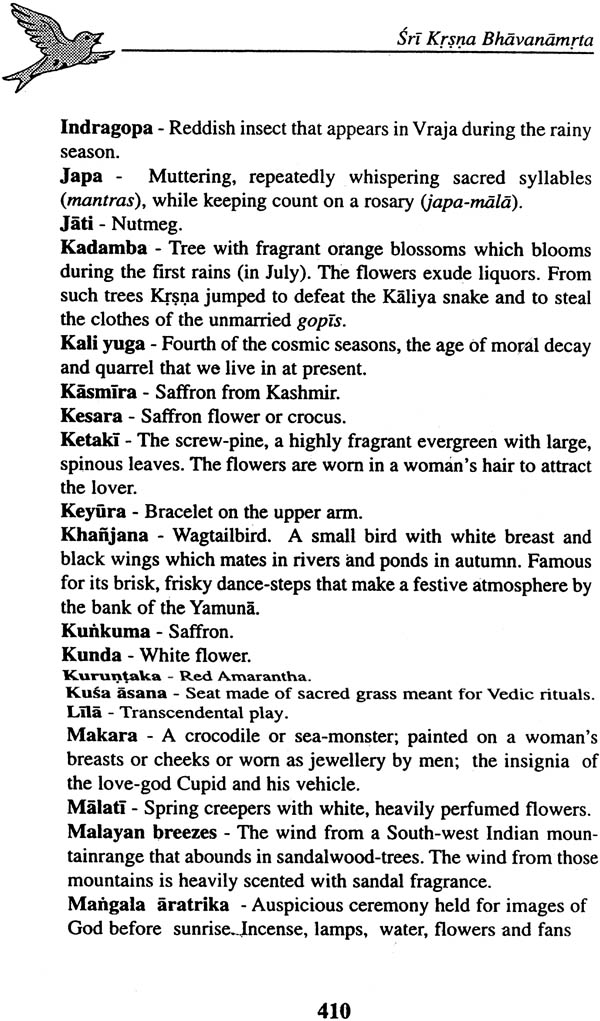
The Krsna (Krishna) Bhavanamrta Mahakavya: Eternal Nectarean Medition on Sri Krsna (Transliteration with English Translation)
Book Specification
| Item Code: | IDH099 |
| Author: | Srila Visvanatha Cakravartipada Translated by Advaita Dasa |
| Publisher: | RAS BIHARI LAL AND SONS |
| Language: | (Transliteration with English Translation) |
| Edition: | 2000 |
| ISBN: | 9788187812098 |
| Pages: | 413 |
| Cover: | Hardcover |
| Other Details | 8.5" X 5.5" |
| Weight | 630 gm |
Book Description
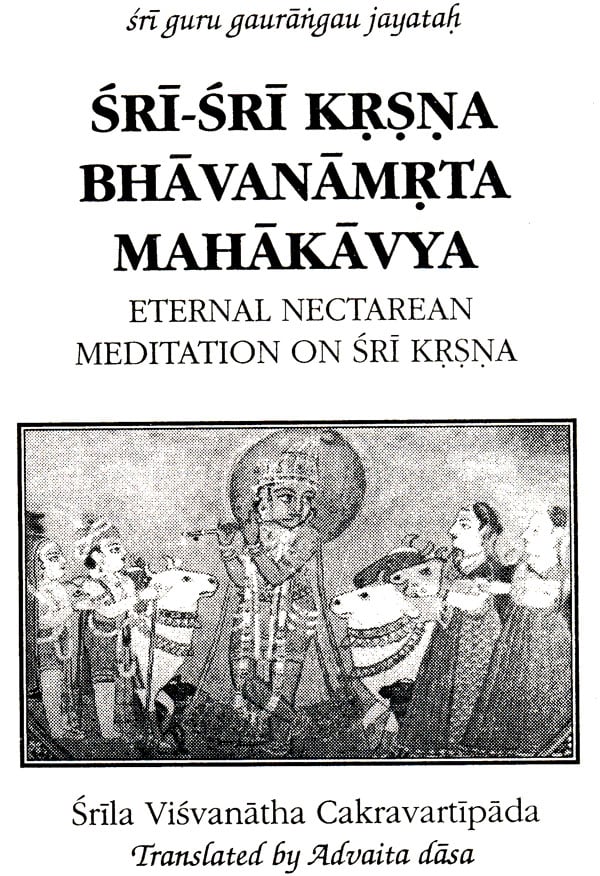
About the Book
How can neophytes relish this Rasa-lila with their tongues? Those people whose eyes were blessed to witness it because they were born here (while Krsna performed His manifest pastimes) are also unable to describe this sweetness. Even if Prema, sacred Love itself, would be the Lord and engaged some elever people to describe it, they would also be unable to do so, for their voices would have been choked by the ecstasy of love)
INTRODUCTION
Srila Visvanatha Cakravarti Thakura was called 'the rein-carnation of Srila Rupa Gosvami' by his direct disciple and main commentator Sri Krsnadeva Sarvabhyauma, because he took the brilliant poetry of Sri Rupa, that was clearly the source of inspiration for all the successive Gaudiya Vaisnava Acaryas, to a possibly even further stage of beauty and rasa (transcendental flavour), it is almost as if Sri Rupa, after his disappearance from the manifest plane, thought to himself: I could have driven it (the rasika descriptions of Sri-Sri Radha Krsna's pastimes) even further!", and then decided to descend as Srila Visvanatha Cakravarti.
The opinions about the date of Visvanatha Cakravarti's birth and demise differ strongly. Options about his birth date vary from 1619 to 1664 AD and of his disappearance from 1689 to 1706. at any rate, he was born in a brahmana family in Bengal and was initiated in the parivara (disciplic succession) of Srila Narottama Thakura Mahasaya. Sri Narottama's disciple was Sri Ganga Narayana Cakravarti, whose disciple was Sri Krsna Carana Cakravarti, who was the initiating guru of Radha Ramana Cakravarti. This Radha Ramana Cakravarti was the initiating guru of Srila Visvanatha Cakravarti.
Srila Visvanatha Cakravarti is known as a very prolific writer and poet, a preacher of Sri Caitanya Mahaprabhu's sam-pradaya (tradition) and the topmost rasika (devotee-connoisseur), specialized in the conjugal mellows of Lord Krsna's pastimes. Few argue the fact that he was the most important Gaudiya Vaisnava Acarya and writer after the Six Gosvamis of Vraja. He is particulary well known for ousting the controversial scholar-guru Rupa Kaviraja from the Gaudiya sam-pradaya and establishing the Gaudiya sam-pradaya as a spiritual community that was authorized to worship the deity of Radha-Govinda in Jayapura.
It is said that the leaders of the Ramanandi-sampradaya asked the Gaudiya priests of Govinda deva in Jayapura to which of the four established sampradayas they belonged. When they rplied that they belonged to the sam-pradaya of Sri Caitanya Mahaprabhu, the Ramanandi-leaders decided that they were not connected with a bona fide sam-pradaya, and deprived them of the right to serve the Deity. The Gaudiya devotees then requested Srila Visvanatha Cakravarti to help them get the service back, but Cakravartipada was bound to a vow never to leave the holy place of Radhakunda, so he sent his two disciples Baladeva Vidyabhusana and Sri Krsnadeva Sarvabhauma to Galt (a village near Jayapura). Within seven days Srila Baladeva Vidyabhusana then wrote to be recognised as bona fide) named Govinda Bhasya, after which the Gaudiya Sampradaya was officially recognised as a sam-pradaya. Some now consider the Gaudiya Sampradaya as a fifth, extra sam-pradaya, while some because of Baladeva Vidyabhusana's presentation of a disciplic succession (parampara) in his book Prameya Ratnavali - consider it as belonging to the sect of Madhvacarya.
Another story about Srila Visvanatha Cakravarti is that some fanatic svakiya-vadis, those who believe that Sri Krsna only enjoys conjugal affairs within marriage, became very angry with him for boldly preaching parakiya vada, the opinion that Krsna mostly enjoys extra-marital affairs and they went out to kill him. While they were on their way to his abode, they met a beautiful young girl of about thirteen year old. They asked her: "Do you know where Visvanatha Cakravarti lives?" The girl said: "I have no time to answer such questions now! I am on my way to Yavata, the abode of Radharani's husband Abhimanyu, to bring Her flowers!" The men were shocked to hear about the existence of a husband of Radharani's other than Sri Krsna. Just then Visvanatha Cakravarti passed by and the svakiya vadis fell at his feet to beg forgiveness from him.
This book, Sri Krsna Bhavanamrta Mahakavya (The eternal, Nectarean meditation on Sri Krsna) is the third and final elaboration on Srila Rupa Gosvami's aphorisms on asta-kaliya lila, the eternally revolving eight-fold transcendental pastimes of Sri-Sri Radha-Krsna, after Sri Krsna dasa Kaviraja's Govinda Lilamrta and Sri Kavi Karnapura's "Krsnahnika Kaumudi" these books have composed to aid the devotees who wish to train their minds in lila smarana, remembrance of these transcendental pastimes in a scheduled way on a daily basis. Other beautiful works of Sri Visvanatha Cakravarti include :
Camatkara Candrika - (A moonbeam of Astonishment), describing four naughty meeting of Radha and Krsna.
Prema Samputa - (The Love Box) describing how Krsna slyly manages to interview Sri Radhika about Her love for Him.
Surata Kathamrta -(Nectarean Erotic Conversations) which describes a romantic conversation of Radha and Krsna.
Vraja Riti Cintamani -(The divine Jewel of Vraja's customs), which describes the glories of Vraja's holy place.
Sankalpa Kalpadruma -(A Desire Tree of Devotional Aspirations), 104 prayer for manjari seva (service to Sri Radhika as a spiritual maidservant).
Raga Vartma Candrika - (A Moonbeam on the path of Sacred Passion), a short book which describes the path of raganuga Bhakti, devotion following one's sacred passion.
Madhurya Kadambini - (A Cloud bank of Sweetness), which discusses the symptoms of stagnation and advancement on the path of devotion.
Svapna Vilasa - A short work about Gaura Tattva in the form of a loving conversation between Sri-Sri Radha-Krsna.
Ksanada Gita Cintamani - A songbook for the night, following the monthly lunar calendar.
Ujjvala Nilamani Kirana - A summary of Srila Rupa Gosvami's Ujjvala Nilamani'.
Bhakti Rasamrta Sindhu Bindu - (A Deluge of Nectarean Prayers) A collection of prayers, like Guruvastakam, Nikunja Rahasya Stava, Sri Radha-Dhyana, Anuraga Valli, Vrndadevyastakam, Krsnakundastakam, Svarupa Caritastakam, Rupa Cintamani, Nandisvarastakam, Gitavali and many many more.
Commentaries - Sarartha Darsini (On Srimad Bhagavata) Sarartha Varsini (On Bhagavad Gita) Bhakti Sara Pradarsini (On Ujjvala Nilamani), Mantrartha Dipika (On the Kama Gayatri Mantra), Mahati (on Dana Keli Kaumudi), Vivrti (on Vidagdha Madhava), Sukha Vartini (on Ananda Vrndavana Campu), and unfinished commentaries on Prema Bhakti Candrika and Caitanya Caritamrta.
The readers may be struck by the intimacy of Radha and Krsna's pastimes that are described in this book Sri Krsna Bhavanamrta, but that should not be the cause of fear of becoming sexually agitated. The pastimes described here have absolutely nothing to do with the sexual affairs of couples in the mundane sphere. They are, rather, the completely transcendental (and thus purifying) exchange between the Supreme Personality of Godhead Sri Krsna and His internal pleasure potency Sri Radhika. Sri Sukadeva Muni declared in the final verse of the rasa pancadhyaya (the five chapters of Srimad Bhagavata that deal with Sri Krsna's Rasa-Lila
"Anyone who faithfully hears and describes the pastimes of Lord Visnu (Krsna) with the girls of Vraja will attain the highest devotion to God (the mood of the gopis) and will swiftly become free from the heart's disease of lust." Faith means knowing that this is a transcendentally purifying topic, rather than the opposite. Still, these topics must of course be discussed in private with devotees who have the above mentioned faith.
The above authorized statement automatically lead to the conclusion that one need not be fully free from sexual desires in order to be qualified to read this book. Faith and love alone are sufficient.
This book 'Krsna Bhavanamrta' is subtitled 'Mahakavya', which means 'great Sanskrit Poem'. It was not altogether possible to perfectly reflect the brilliant poetic verses of Srila Visvanatha Cakravarti in the English language. The literary approach to Sanskrit kavya seems futile: the ideals, aims, subtleties, constructions and standards are so utterly different from vocabulary of transcendental rasa. Neither the literary nor the literal approach can convey the sensual impact of the poem, the sence-sound of the original; the compactness it achieved by compounding groups of words into monolithical units. Kavya is untranslatable because it is not only in Sanskrit, it is Sanskrit.
| Introduction | 5 | |
| Chapter One: | ||
| "Nisanta-lila" -Pastimes at dawn (3.36-6.00 a.m.) | 11 | |
| Chapter Two: | ||
| Pastimes at dawn, continued | 25 | |
| Chapter Three: | ||
| "Pratah-lila" - Morning Pastimes (6.00 - 8.24 a.m.) "Rasodgra" - Sri Radhika recollects the previous night's pastimes with Her girlfriends | 49 | |
| Chapter Four: | ||
| Sri Radhika's bath, dressing and ornamentation | 71 | |
| Chapter Five: | ||
| Sri Radhika goes to Nandisvara to cook for Krsna | 103 | |
| Chapter Six: | ||
| Breakfast and other pastimes | 123 | |
| Chapter Seven: | ||
| "Purvahna-lila" - Pastimes at forenoon Gostha-lila - Pastimes in the Pastures | 145 | |
| Chapter Eight: | ||
| "Vipina-vihara" - Pastimes in the forest | 161 | |
| Chapter Nine: | ||
| "Madhyahna Lila" - Midday pastimes (10.48-15.36) Flowerplays and Loveplays | 177 | |
| Chapter Ten | ||
| Relishing the nectar of playing in the kunja | 201 | |
| Chapter Eleven: | ||
| "Hindola-lila" : Swinging Pastimes | 219 | |
| Chapter Twelve: | ||
| "Vana-bhramana" - wanderings in the Forest | 235 | |
| Chapter Thirteen: | ||
| "Madhupana-lila" - Honey drinking Play | 263 | |
| Chapter Fourteen: | ||
| "Jala-keli" - Watersports | 277 | |
| Chapter Fifteen: | ||
| "Aksa-krida" - Dice game and "Surya-puja"- Worshipping the Sungod | 295 | |
| Chapter Sixteen: | ||
| "Aparahna-lila" - Afternoon pastimes (15.36 -18.00) | 315 | |
| Chapter Seventeen: | ||
| "Sayahna lila" - Evening Pastimes (18.00-20.24) | 329 | |
| Chapter Nineteen: | ||
| "Nakta lila" - Night pastimes (22.48 - 03.36) Rasa-lila | 363 | |
| Chapter Twenty: | ||
| End of the day | 389 | |
| Glossary | 409 | |
| Notes at the end of every chapters. |


